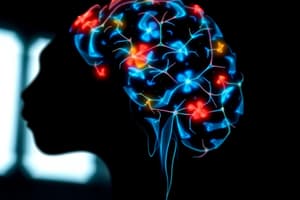Podcast
Questions and Answers
In classical conditioning, what is the primary role of a neutral stimulus?
In classical conditioning, what is the primary role of a neutral stimulus?
- To elicit an involuntary, automatic response directly.
- To act as a reinforcement, increasing the probability of a specific response.
- To initially have no effect, but become associated with a natural stimulus to trigger a conditioned response. (correct)
- To serve as a punishment that decreases the likelihood of a behavior.
According to the law of effect, which scenario is most likely to result in a behavior being repeated?
According to the law of effect, which scenario is most likely to result in a behavior being repeated?
- A behavior is consistently paired with a neutral stimulus, leading to habituation.
- A behavior is followed by a stimulus that the organism finds aversive.
- A behavior is followed by consequences that the organism finds satisfying. (correct)
- A behavior is ignored, leading to extinction of the response.
What is the key difference between operant and classical conditioning?
What is the key difference between operant and classical conditioning?
- Operant conditioning always results in increased behavior, while classical conditioning always leads to decreased behavior.
- Operant conditioning focuses on consequences of behaviors, while classical conditioning creates associations between stimuli. (correct)
- Operant conditioning was discovered by Ivan Pavlov, while classical conditioning was discovered by B.F. Skinner.
- Operant conditioning involves involuntary behaviors, while classical conditioning focuses on voluntary behaviors.
Which of the following examples illustrates negative reinforcement?
Which of the following examples illustrates negative reinforcement?
In the context of stimulus-response theory, how do individuals primarily learn?
In the context of stimulus-response theory, how do individuals primarily learn?
Which of the following best describes the behaviorist perspective on human motivation?
Which of the following best describes the behaviorist perspective on human motivation?
What is the central focus of behaviorism as a grand theory of human development?
What is the central focus of behaviorism as a grand theory of human development?
According to the behavioral perspective, what is the primary factor influencing human development?
According to the behavioral perspective, what is the primary factor influencing human development?
Which statement aligns with the behaviorist view on nature versus nurture?
Which statement aligns with the behaviorist view on nature versus nurture?
How do behaviorist theories differ from stage-based theories of development?
How do behaviorist theories differ from stage-based theories of development?
According to the behavioral perspective, what characterizes developmental patterns?
According to the behavioral perspective, what characterizes developmental patterns?
How is developmental change viewed within the behavioral perspective?
How is developmental change viewed within the behavioral perspective?
What role does reinforcement play in the process of conditioning, according to behaviorism?
What role does reinforcement play in the process of conditioning, according to behaviorism?
Flashcards
Classical Conditioning
Classical Conditioning
Creating an association between a natural stimulus and a neutral one.
Operant Conditioning
Operant Conditioning
Using reinforcement or punishment to change a behavior.
Stimulus-Response Theory
Stimulus-Response Theory
Behavior is influenced by the consequences of actions.
Law of Effect
Law of Effect
Signup and view all the flashcards
Positive Reinforcement
Positive Reinforcement
Signup and view all the flashcards
Behavioral Perspective
Behavioral Perspective
Signup and view all the flashcards
Behaviorism
Behaviorism
Signup and view all the flashcards
Conditioning
Conditioning
Signup and view all the flashcards
Behavioral Development
Behavioral Development
Signup and view all the flashcards
Stimuli & Behavior
Stimuli & Behavior
Signup and view all the flashcards
Nurture vs. Nature
Nurture vs. Nature
Signup and view all the flashcards
Impact of Stimuli
Impact of Stimuli
Signup and view all the flashcards
Conditioning Process
Conditioning Process
Signup and view all the flashcards




